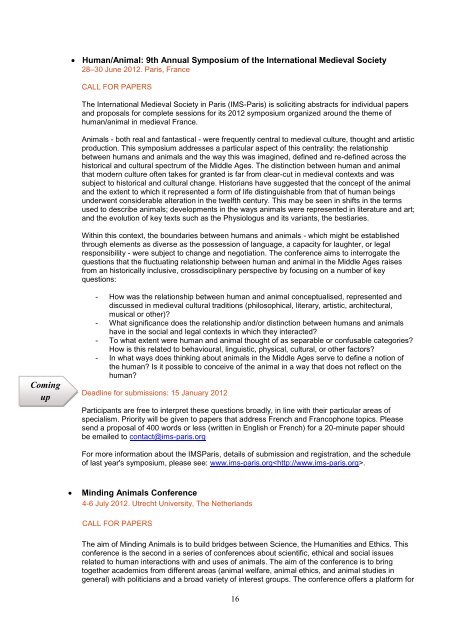News Bulletin - Australian Animal Studies Group
News Bulletin - Australian Animal Studies Group
News Bulletin - Australian Animal Studies Group
You also want an ePaper? Increase the reach of your titles
YUMPU automatically turns print PDFs into web optimized ePapers that Google loves.
Coming<br />
up<br />
Human/<strong>Animal</strong>: 9th Annual Symposium of the International Medieval Society<br />
28–30 June 2012. Paris, France<br />
CALL FOR PAPERS<br />
The International Medieval Society in Paris (IMS-Paris) is soliciting abstracts for individual papers<br />
and proposals for complete sessions for its 2012 symposium organized around the theme of<br />
human/animal in medieval France.<br />
<strong>Animal</strong>s - both real and fantastical - were frequently central to medieval culture, thought and artistic<br />
production. This symposium addresses a particular aspect of this centrality: the relationship<br />
between humans and animals and the way this was imagined, defined and re-defined across the<br />
historical and cultural spectrum of the Middle Ages. The distinction between human and animal<br />
that modern culture often takes for granted is far from clear-cut in medieval contexts and was<br />
subject to historical and cultural change. Historians have suggested that the concept of the animal<br />
and the extent to which it represented a form of life distinguishable from that of human beings<br />
underwent considerable alteration in the twelfth century. This may be seen in shifts in the terms<br />
used to describe animals; developments in the ways animals were represented in literature and art;<br />
and the evolution of key texts such as the Physiologus and its variants, the bestiaries.<br />
Within this context, the boundaries between humans and animals - which might be established<br />
through elements as diverse as the possession of language, a capacity for laughter, or legal<br />
responsibility - were subject to change and negotiation. The conference aims to interrogate the<br />
questions that the fluctuating relationship between human and animal in the Middle Ages raises<br />
from an historically inclusive, crossdisciplinary perspective by focusing on a number of key<br />
questions:<br />
- How was the relationship between human and animal conceptualised, represented and<br />
discussed in medieval cultural traditions (philosophical, literary, artistic, architectural,<br />
musical or other)?<br />
- What significance does the relationship and/or distinction between humans and animals<br />
have in the social and legal contexts in which they interacted?<br />
- To what extent were human and animal thought of as separable or confusable categories?<br />
How is this related to behavioural, linguistic, physical, cultural, or other factors?<br />
- In what ways does thinking about animals in the Middle Ages serve to define a notion of<br />
the human? Is it possible to conceive of the animal in a way that does not reflect on the<br />
human?<br />
Deadline for submissions: 15 January 2012<br />
Participants are free to interpret these questions broadly, in line with their particular areas of<br />
specialism. Priority will be given to papers that address French and Francophone topics. Please<br />
send a proposal of 400 words or less (written in English or French) for a 20-minute paper should<br />
be emailed to contact@ims-paris.org<br />
For more information about the IMSParis, details of submission and registration, and the schedule<br />
of last year's symposium, please see: www.ims-paris.org.<br />
Minding <strong>Animal</strong>s Conference<br />
4-6 July 2012. Utrecht University, The Netherlands<br />
CALL FOR PAPERS<br />
The aim of Minding <strong>Animal</strong>s is to build bridges between Science, the Humanities and Ethics. This<br />
conference is the second in a series of conferences about scientific, ethical and social issues<br />
related to human interactions with and uses of animals. The aim of the conference is to bring<br />
together academics from different areas (animal welfare, animal ethics, and animal studies in<br />
general) with politicians and a broad variety of interest groups. The conference offers a platform for<br />
16


